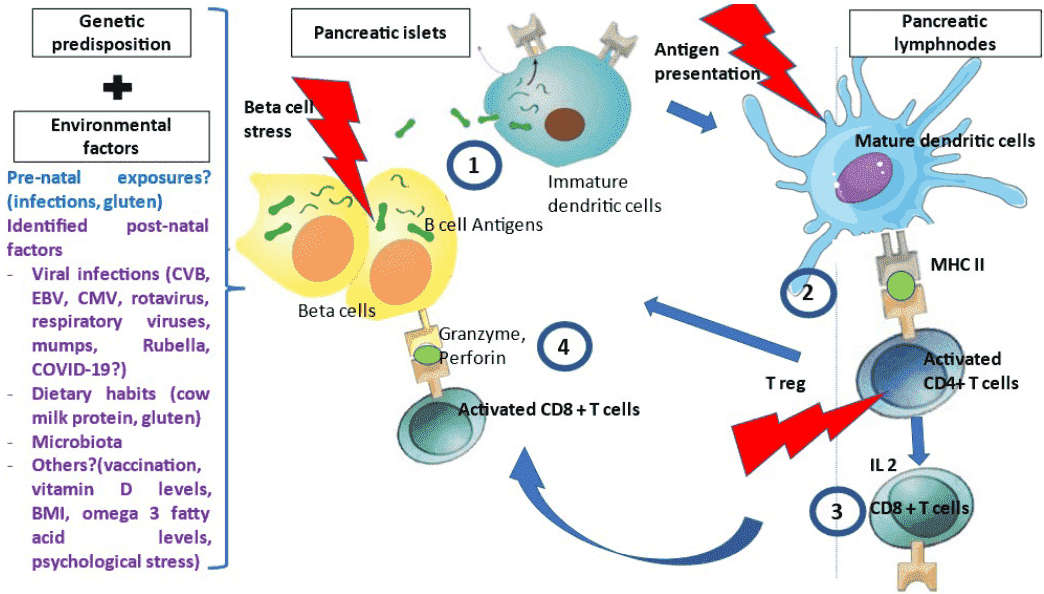NAA and Type 1 Diabetes
Type 1 diabetes prevention trials have used autoantibodies to screen for individuals at increased risk. With over 10 years of custom natural autoantibodies (NAA) experience, Creative Biolabs prides itself on being an innovator and problem solver in the NAA industry. We deliver high-quality NAA services and products.
Description of Type 1 Diabetes
Type 1 diabetes is an autoimmune disease caused by immune-mediated destruction of β cells in the pancreas that can lead to lifelong absolute insulin deficiency. This disease is a chronic process characterized clinically by the initial appearance of islet autoantibodies, followed by the development of dysglycemia, and finally overt hyperglycemia and ketoacidosis due to absolute insulin deficiency. The disease, which accounts for about 10% of all diabetes cases, is most common in people of European descent and affects 2 million people in Europe and North America. For doctors with type 1 diabetes patients, there are two strategies: one is to prevent autoimmune activation; the second is to reverse the effects of ongoing autoimmunity and β cell regeneration.
Type 1 Diabetes Develop Pathway
Several viral infections are associated with type 1 diabetes, with enterovirus being one of the most commonly associated infections. The development of type 1 diabetes is thought to be initiated by the presentation of β-cell peptides by antigen-presenting cells (APCs). APCs bearing these autoantigens migrate to the pancreatic lymph nodes where they interact with autoreactive CD4+ T lymphocytes, which in turn mediate the activation of autoreactive CD8+ T cells. Increased frequency of islet-specific autoreactive CD8+ T lymphocytes and decreased regulatory immune function have been associated with type 1 diabetes. β cell abnormalities can also lead to type 1 diabetes, leading to what is known as β cell suicide. β cell HLA class I overexpression is common in pancreatic sections from cadaveric donors with type 1 diabetes. There is also evidence showed that increased β-cell endoplasmic reticulum stress is associated with accelerated β-cell death.
 Fig.1 The immunopathogenesis of type 1 diabetes.1
Fig.1 The immunopathogenesis of type 1 diabetes.1
NAA Services for Type 1 Diabetes at Creative Biolabs
- NAA Services for Anti-GAD65
- NAA Services for Anti-Insulinoma-Associated-2 (IA-2)
- NAA Services for Anti-islet Cell Cytoplasmic
- NAA Services for Anti-glutamic Acid Decarboxylase (GAD)
- NAA Services for Anti-insulin
Type 1 Diabetes Related Products at Creative Biolabs
Developing potential therapeutic targets and advancing understanding of the pathophysiology of the disease. Currently, four major molecular targets ([pro]insulin, GAD65, IA-2, and ZnT8) have been confirmed, with approximately 94% of all subjects with a clinical diagnosis of type 1 diabetes expressing autoantibodies to at least one of these molecules at clinical onset.
| Target | Product name | Cat.No |
|---|---|---|
| GAD autoantibody | Mouse GAD Autoantibody (IgG) ELISA Kit | NAK-001 |
| Insulin autoantibody | Human Insulin Autoantibody (IgG) ELISA kit | NAK-047 |
| Zinc transporter 8 (SLC30A8) autoantibody | Human Zinc transporter 8 (SLC30A8) Autoantibody (IgG) ELISA kit | NAK-011 |
Autoantibodies are currently the most powerful biomarker for type 1 diabetes and are often used to establish criteria for admission of genetically at-risk individuals to participate in secondary prevention/intervention clinical trials. At Creative Biolabs, we team up with you to understand your needs and develop customized NAA services to your satisfaction. We are happy to discuss your objectives so that we can determine which approach and technologies can best be used to get the most reliable answer possible, and in the most efficient way. If you are interested in our services and products, please contact us for more information.
Reference
- Houeiss, Pamela, Sandrine Luce, and Christian Boitard. "Environmental triggering of type 1 diabetes autoimmunity." Frontiers in Endocrinology 13 (2022): 933965.

